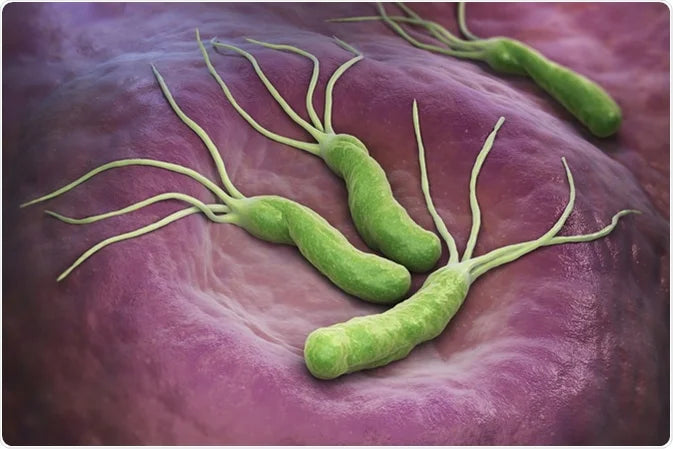
Helicobacter pylori and GERD: Understanding the Overlap
|
|
Time to read 4 min
|
|
Time to read 4 min
The relationship between Helicobacter pylori infection and GERD (gastroesophageal reflux disease) is complex, and often misunderstood. This article explains what science says about how H. pylori affects acid production, reflux symptoms, and treatment decisions.
Disclaimer: The information provided in this blog post is for general knowledge and informational purposes only, and does not constitute medical advice. Always consult with a qualified healthcare professional before making any decisions about your health or treatment. If you experience persistent or severe acid reflux, seek medical attention immediately.
Helicobacter pylori (H. pylori) is a spiral-shaped bacterium that colonizes the stomach lining. It's extremely common worldwide and is often acquired during childhood. Many people with H. pylori never experience symptoms, but in some cases, it contributes to:
Chronic gastritis
Peptic ulcers
Stomach cancer (in rare cases)
The infection alters the stomach's environment, particularly its acid-producing cells, and that's where the relationship to GERD becomes relevant.
Gastroesophageal reflux disease (GERD) occurs when stomach contents reflux into the esophagus, causing symptoms like:
Heartburn
Regurgitation
Chest discomfort
Chronic cough or throat irritation
GERD is usually caused by a weakening of the lower esophageal sphincter (LES) or increased pressure in the abdomen, allowing acid to escape the stomach. However, the amount of acid produced, and how the stomach handles it, can also influence GERD symptoms.
H. pylori colonization affects gastric acid production in different ways depending on the location and severity of infection.
Increases gastrin levels
Leads to hyperchlorhydria (increased stomach acid production)
May worsen acid reflux symptoms in some individuals
Damages acid-secreting cells
Leads to hypochlorhydria (reduced stomach acid production)
May reduce GERD symptoms, but can cause other complications
Because of this dual effect, the role of H. pylori in GERD isn’t straightforward. In some people, the infection aggravates acid reflux, while in others, it may offer a protective effect by reducing acidity.
Note: Protective effects against GERD generally occur only once atrophic changes are advanced, a condition that carries its own long-term risks (e.g., gastric cancer).
There is no consistent evidence that H. pylori directly causes GERD. In fact, studies have found mixed results:
Neutral or mixed findings: In Western countries, where GERD is common, H. pylori is less prevalent, suggesting it may not be a key driver. (Ghoshal & Chourasia, 2010)
Protective associations: Some studies show lower GERD rates in people with H. pylori, suggesting H. pylori may be a protective factor for GERD. (Zhao, Liu, & Li, 2025)
Post-eradication changes: Others suggest that eradication of H. pylori can occasionally increase reflux symptoms, especially in patients with pre-existing GERD. (Shinozaki et. al, 2021)
In clinical practice, the individual’s acid profile, anatomy, and LES function are more predictive of GERD risk than H. pylori status alone.
Curious about your digestive wellness? Claisen offers a free, personalized quiz designed to uncover the factors influencing your gut health. Discover your unique profile and get the insights you need to thrive.
If GERD symptoms increase after eradication therapy, several strategies may help:
Eat smaller, slower meals, ideally spread throughout the day.
Avoid eating within 2-3 hours of lying down.
Refrain from drinking large amounts of fluid during meals.
This approach reduces pressure on the stomach and minimizes acid reflux episodes.
Certain foods are more likely to worsen acid reflux during treatment. These may include:
Citrus fruits and juices
Tomato-based sauces
Chocolate
Fried or fatty foods
Carbonated beverages
Caffeinated drinks
Peppermint
Instead, focus on:
Lean proteins (chicken, fish, tofu)
Non-citrus fruits (bananas, melons)
Cooked vegetables
Oatmeal or whole grains
Avoid reclining or lying down for at least 2-3 hours after eating, as this gives gravity time to assist digestion and prevents acid from moving upward into the esophagus.
H. pylori affects acid production and may worsen or protect against GERD depending on the pattern of infection.
H. pylori does not directly cause GERD, but may influence how severe symptoms are.
Long-term outcomes are generally favorable when H. pylori treatment is paired with effective GERD management.
Ready for personalized relief for GERD? Complete Claisen's gut health quiz to identify your unique reflux triggers and receive evidence-based recommendations tailored to your digestive profile.
Ghoshal, U. C., & Chourasia, D. (2010). Prevalence of Helicobacter pylori infection and antral gastritis in consecutive patients with no upper gastrointestinal symptoms in a North Indian population. Journal of Neurogastroenterology and Motility, 16(3), 243–248. https://doi.org/10.5056/jnm.2010.16.3.243
Shinozaki, A., et al. (2021). The impact of H. pylori eradication on gastroesophageal reflux disease: a prospective study. Scandinavian Journal of Gastroenterology, 56(6), 719–725. https://doi.org/10.1080/00365521.2021.1975310
Zhao, X., Liu, Y., & Li, J. (2025). Association between H. pylori infection and GERD in Chinese adults: a cross-sectional cohort study. Frontiers in Cellular and Infection Microbiology, 13, 1082620. https://doi.org/10.3389/fcimb.2023.1082620
This article and its contents have been medically reviewed by Aditya Jain (MD at Harvard Medical School and Op-Ed Fellow at Doximity).
Not routinely. Testing is typically done if you have ulcer symptoms, gastritis, or are at risk for H. pylori-related complications.
No. GERD is more related to LES dysfunction and anatomical factors. H. pylori treatment may change acid production, but it doesn’t resolve reflux for most people.
Via breath tests, stool antigen tests, or endoscopic biopsy during an upper GI exam.
Possibly, but not always. If it does, symptoms are typically mild and treatable with standard reflux therapies.
